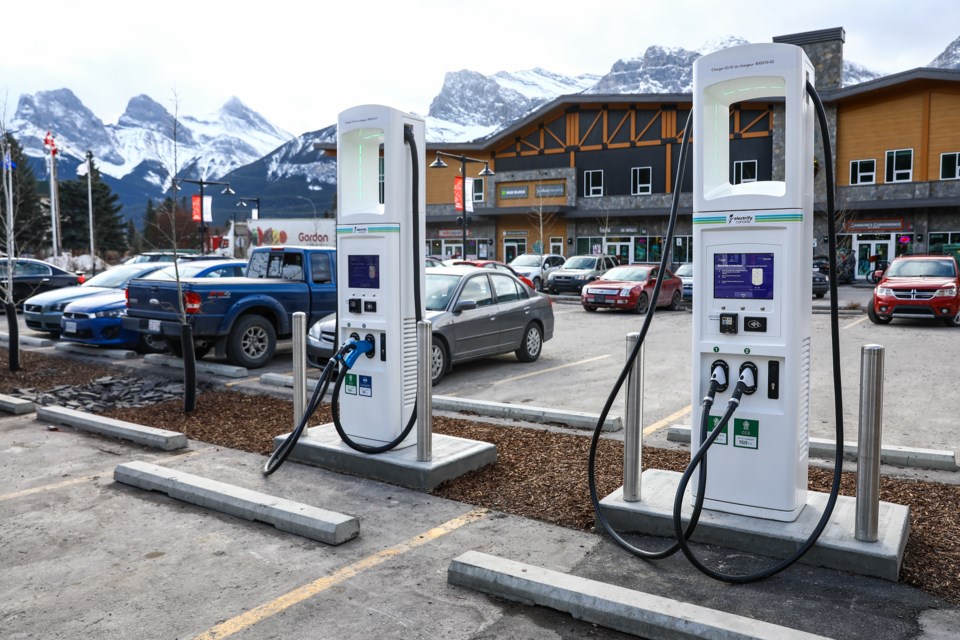CANMORE – A recently released report by the Town of Canmore is recommending the municipality transition some, but not all, of its fleet to electric vehicles.
The report, prepared by Atco, was presented to council at its October committee of the whole meeting, prior to consideration of reinstating a 2020 capital budget fleet replacement project that had been previously postponed due to COVID.
Streets and roads supervisor Geordie Heal and climate change specialist Amy Fournier spoke about the report, which was partially funded by a grant from the Municipal Climate Change Action Centre.
Heal said the goal of the study was to examine the price and type of electric vehicles available on the market and compare them with the municipality's fleet of vehicles and the schedule for vehicle replacements.
"We simply need to start thinking this way," he said. "How can we explore and implement a more sustainable fleet, keep pace with industry and align ourselves with government targets?"
The Town of Canmore has 104 assets in its fleet: which includes heavy-duty equipment, smaller cars, bicycles, a boat, trailers and utility equipment. With electric vehicle technology advancing and available rebates, Heal said there are some long-term cost savings available by transitioning away from the internal combustion engine options when it comes time for replacing these assets.
Fournier said there are also benefits when it comes to the municipality's climate change commitments and targets to reduce greenhouse gas emissions.
"In our 2018 climate action plan, we have actions to both look at electric vehicles in our fleet, as well as to also look at how we support electric vehicles in our community," she said. "Having electric vehicles for use for Town business and building out Town infrastructure in the community also helps to normalize electric vehicle use in the broader community."
Fournier said the feasibility study will help the municipal government make decisions in the future, as it provided a robust cost-benefit analysis for a variety of vehicles that are up for replacement soon. It also looked at the different charging requirements and the cost to install those.
"As well, it provided us with a bit of a look forward as to what kind of electric vehicles are anticipated to be coming onto the market in the next few years," she said.
Two rebates are currently available to the Town of Canmore from the federal government and the Municipal Climate Change Action Centre. Fournier said the rebates bring down the cost on some replacement models to almost on par with, or less than the conventional model.
The 60-page report identified four upcoming replacement vehicles as possible options. The replacement cost for a Chevrolet Cruz would be $21,000, but a Hyundai Ioniq EV would cost $22,500 with rebates.
A Chevrolet Trax replacement would be $25,092, but a Hyundai Kona EV would be $26,000 with rebates. The Kubota RTV would cost $20,000 to replace, but a Rolaris RTV would be $15,278 with rebates.
Finally, an ice resurfacer due for replacement would cost $119,355, but a Zamboni electric ice resurfacer would cost $118,500 with rebates.
The Hyundai models would require a level two charging station – proposed at the old downtown visitor information centre and rec centre – at a cost of $2,460 and $2,150. The Polaris RTV could be plugged into a regular outlet and would require no additional infrastructure.
Each vehicle also provides an annual savings in terms of fuel and maintenance. All four would have paid back the additional upfront cost to purchase the EVs and install charging infrastructure in under two years, according to the report.
"The important thing for us to be mindful of with EV charging is we do not want to be contributing to new peak electricity demand because those peaks drive a lot of our costs that we pay for electricity," Fournier said. "There are a number of strategies to manage that."
The report also presented the possibility of in the future the EV fleet being available as part of a car-share program.
Fournier acknowledged that there is still a carbon footprint from using the electric grid to power the vehicles, but noted that Alberta is transitioning away from coal-fired power generation.
Mayor John Borrowman said it makes sense to pursue electric vehicles for fleet replacement.
"From my perspective, it does not make sense to miss an opportunity for a sizeable rebate if the vehicles are getting closer to their replacement date and it is moving us toward our climate action goals," he said.
Meanwhile, a new level three charging station has been installed at the Shops of Canmore.
Electrify Canada has expanded its network into Alberta with the high-speed charging station, close to the Trans-Canada Highway – a factor considered when choosing the new location.
“We are pleased to be working with Electrify Canada on this project,” said Neil Tanner, who developed the Shops of Canmore, in a press release. “These electric vehicle charging stations are one more point of difference that elevates The Shops of Canmore. We are excited to be able to offer this service to our patrons.”
Other EV charging stations in the community are located at the Petro Canada on Bow Valley Trail, in the parking lot behind the Miners' Union Hall and at artsPlace.




